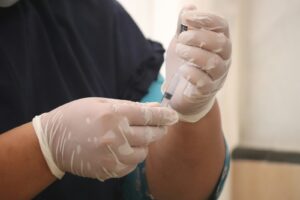Marginalisation ‘plays a major part’ in vaccine hesitancy
Vaccination rates are markedly lower among disabled people as well as Black African, Black Caribbean and Muslim people, the Office for National Statistics (ONS) has revealed.
According to the Office for National Statistics (ONS), all residents in England aged 70 years and over had received at least one dose of a Covid-19 vaccine.
However, the percentage vaccinated was lower among all ethnic minority groups compared with the White British population. According to the ONS statistics, the lowest vaccination rates were observed among people identifying as Black African and Black Caribbean (58.8% and 68.7% respectively), followed by people from Bangladeshi (72.7%) and Pakistani (74.0%) backgrounds.
Vaccination rates also differed by religious affiliation, with the lowest rate being among those who identified as Muslim (72.3%), followed by Buddhist (78.1%); lower rates were also observed among those identifying as Sikh (87.0%) and Hindu (87.1%).
Disabled people who reported being limited a lot in their day-to-day activities had lower rates of vaccination (86.6%) compared with those who were non-disabled (91.0%).
ONS found that those living in more deprived areas were less likely to have been vaccinated than those living in less deprived areas.
Statistical modelling suggests the lower rates of vaccination observed in ethnic minorities, certain religious groups, and disabled people are not fully explained by differences in other geographical and socio-demographic factors or underlying health conditions.
Ben Humberstone, ONS health analysis said: ‘Vaccination rates are markedly lower amongst certain groups, in particular amongst people identifying as Black African and Black Caribbean, those identifying as Muslim, and disabled people.
‘These differences remain after accounting for geography, underlying health conditions and certain indicators of socio-economic inequality.’
Responding to the ONS figures, Dr Layla McCay, director of policy at the NHS Confederation, said marginalisation clearly plays a major part in pushing vaccine uptake down.
‘These figures show us how much progress the vaccination programme has made in just four months, with more than 90 per cent of those aged over 70 have already received a first dose.
‘That’s thanks to the huge efforts of our members locally, who have done so much to reach their communities alongside their other healthcare responsibilities. With 30m first doses now given and 3.5m second doses, the NHS has made incredible headway.
‘However, the figures also demonstrate there is still more work to do to make sure, first and foremost, that access to vaccination is equitable, and secondly, to overcome vaccine hesitancy, as marginalisation clearly plays a major part in pushing uptake down.
‘The vaccination programme is among the strongest tools at our disposal in the fight against Covid-19 and offers a clear way past the pandemic.
‘It is therefore vital that there are as few barriers as possible so that the communities who have been so disproportionately affected by the disease are properly supported to receive their jabs.
‘NHS organisations are actively working to improve vaccine confidence, and those efforts will continue. Until everyone is protected, no one is protected.’
Photo Credit – Pixabay
















